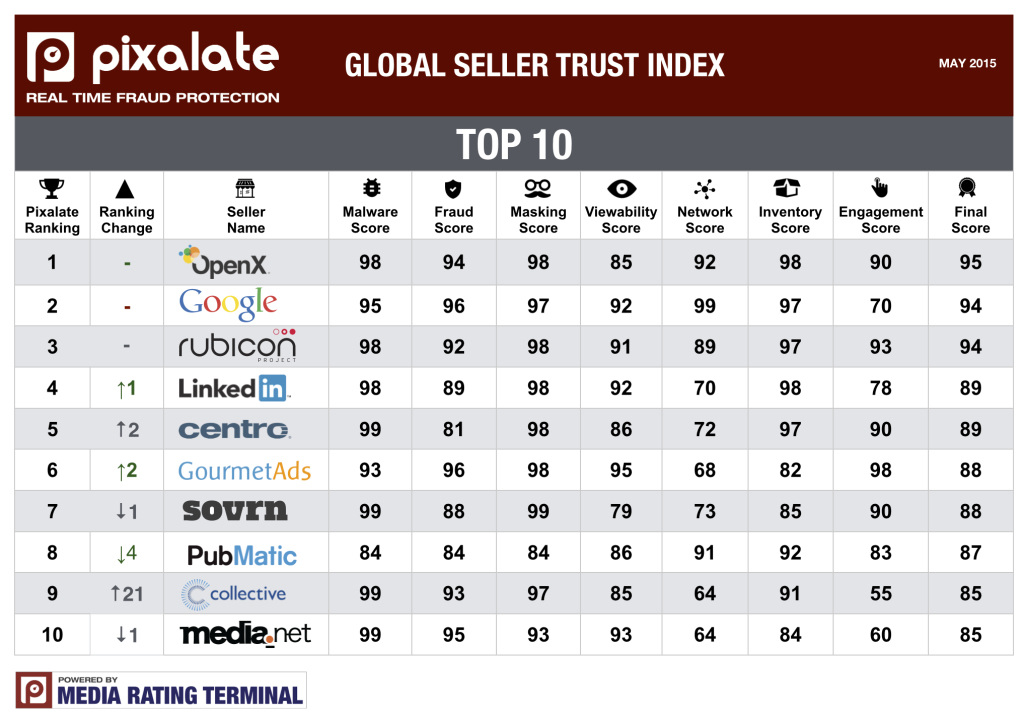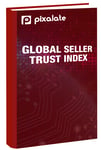
Pixalate, Inc., the leader in fraud protection and data intelligence, today announced the May 2015 Pixalate Global Seller Trust Index™ (GSTI), the standard in programmatic advertising quality ratings. The May 2015 GSTI focuses on providing campaign-level data for media buyers including malware, quality and pricing data of sellers categorized by Interactive Advertising Bureau (IAB) advertising quarters. In Q1 2015, Pixalate found that the majority of programmatic advertising fraud is a result of malware or a malware-infected machine. More information available at http://www.pixalate.com/sellertrustindex
"Trust in advertising cannot be restored without first addressing the cybersecurity risks it poses to enterprises and consumers. To address this ever-growing problem, Pixalate now offers media buyers and publishers an objective security assessment of programmatic sellers in order to ensure consumer and brand safety." Jalal Nasir, Chief Executive Officer, Pixalate
About the Pixalate Seller Trust Index
The monthly Pixalate Global Seller Trust Index is based upon its proprietary technology that analyzes more than 300 billion quarterly impressions and delivers ratings based upon inventory quality and ad performance, along with classic reach ranking. Global quality ratings are based upon an analysis of overall effectiveness assessing viewability, fraud, engagement, domain masking, and inventory scores in compliance with recognized industry standards. To learn more about the methodology and to download an expanded list of the top 50 sellers, visit
http://www.pixalate.com/sellertrustindex
Methodology
The Pixalate Global Seller Trust Index is based upon a weighted analysis of overall quality
assessing malware, pricing, fraud, brand safety, engagement, network and inventory in compliance with recognized industry standards. Pixalate is a certified Media Rating Council for viewability vendor. The monthly Pixalate Global Seller Trust Index is based upon its proprietary technology that analyzes more than 100 billion monthly impressions.
About Pixalate
Pixalate is the leading enterprise marketing data platform for companies that need real-time insights, market intelligence and analytics to make smarter, faster decisions in programmatic advertising. For more information, visit www.pixalate.com.

[button link="http://blog.pixalate.com/download-gsti" color="red" size="" type="" shape="" target="_self" title="" gradient_colors="|" gradient_hover_colors="|" accent_color="black" accent_hover_color="black" bevel_color="" border_width="1px" icon="" icon_position="left" icon_divider="no" modal="" animation_type="0" animation_direction="left" animation_speed="1" alignment="" class="" id=""]Download the Report[/button]
*By entering your email address and clicking Subscribe, you are agreeing to our Terms of Use and Privacy Policy.
These Stories on Seller Trust Index
*By entering your email address and clicking Subscribe, you are agreeing to our Terms of Use and Privacy Policy.

Disclaimer: The content of this page reflects Pixalate’s opinions with respect to the factors that Pixalate believes can be useful to the digital media industry. Any proprietary data shared is grounded in Pixalate’s proprietary technology and analytics, which Pixalate is continuously evaluating and updating. Any references to outside sources should not be construed as endorsements. Pixalate’s opinions are just that - opinion, not facts or guarantees.
Per the MRC, “'Fraud' is not intended to represent fraud as defined in various laws, statutes and ordinances or as conventionally used in U.S. Court or other legal proceedings, but rather a custom definition strictly for advertising measurement purposes. Also per the MRC, “‘Invalid Traffic’ is defined generally as traffic that does not meet certain ad serving quality or completeness criteria, or otherwise does not represent legitimate ad traffic that should be included in measurement counts. Among the reasons why ad traffic may be deemed invalid is it is a result of non-human traffic (spiders, bots, etc.), or activity designed to produce fraudulent traffic.”

